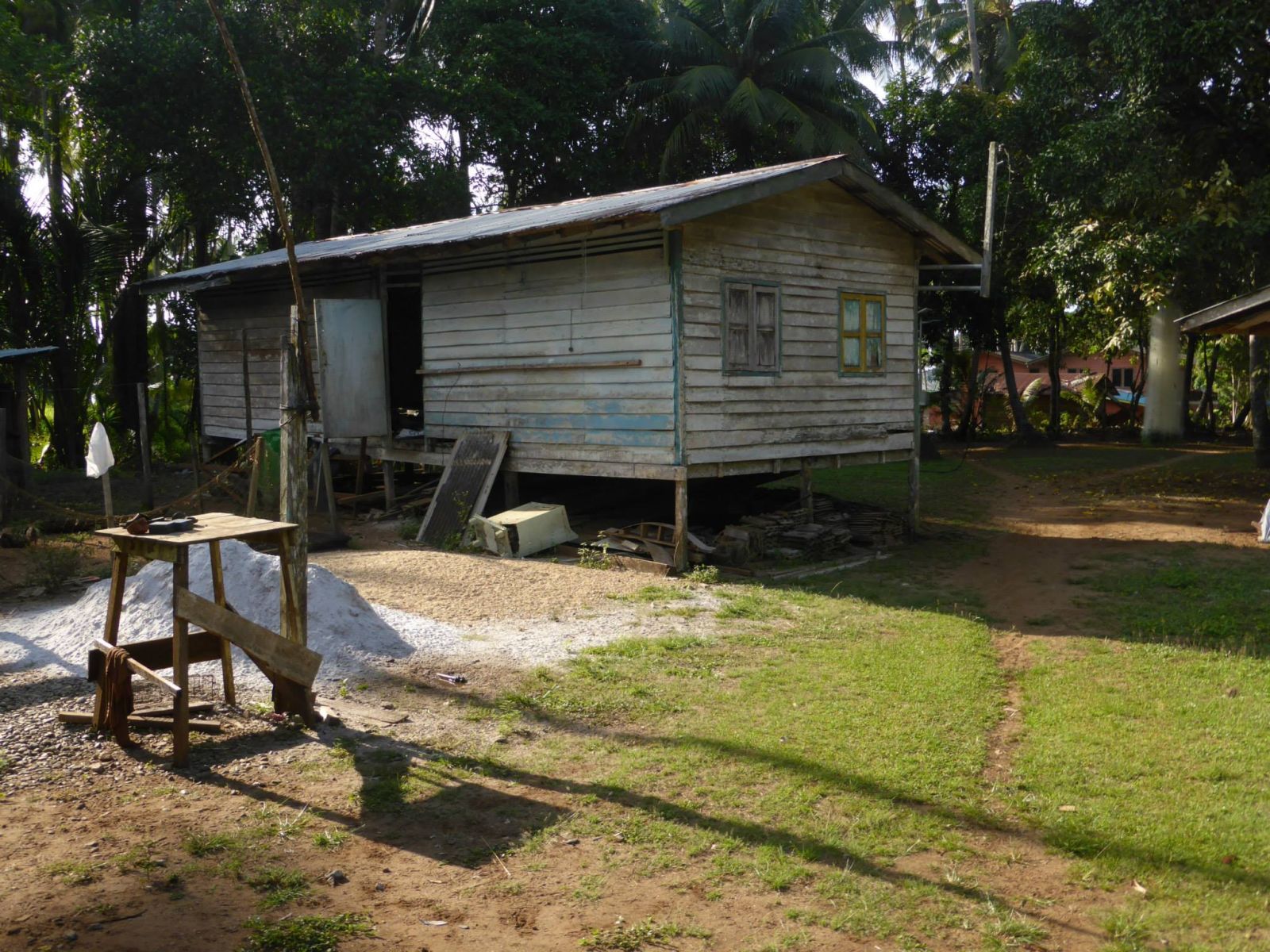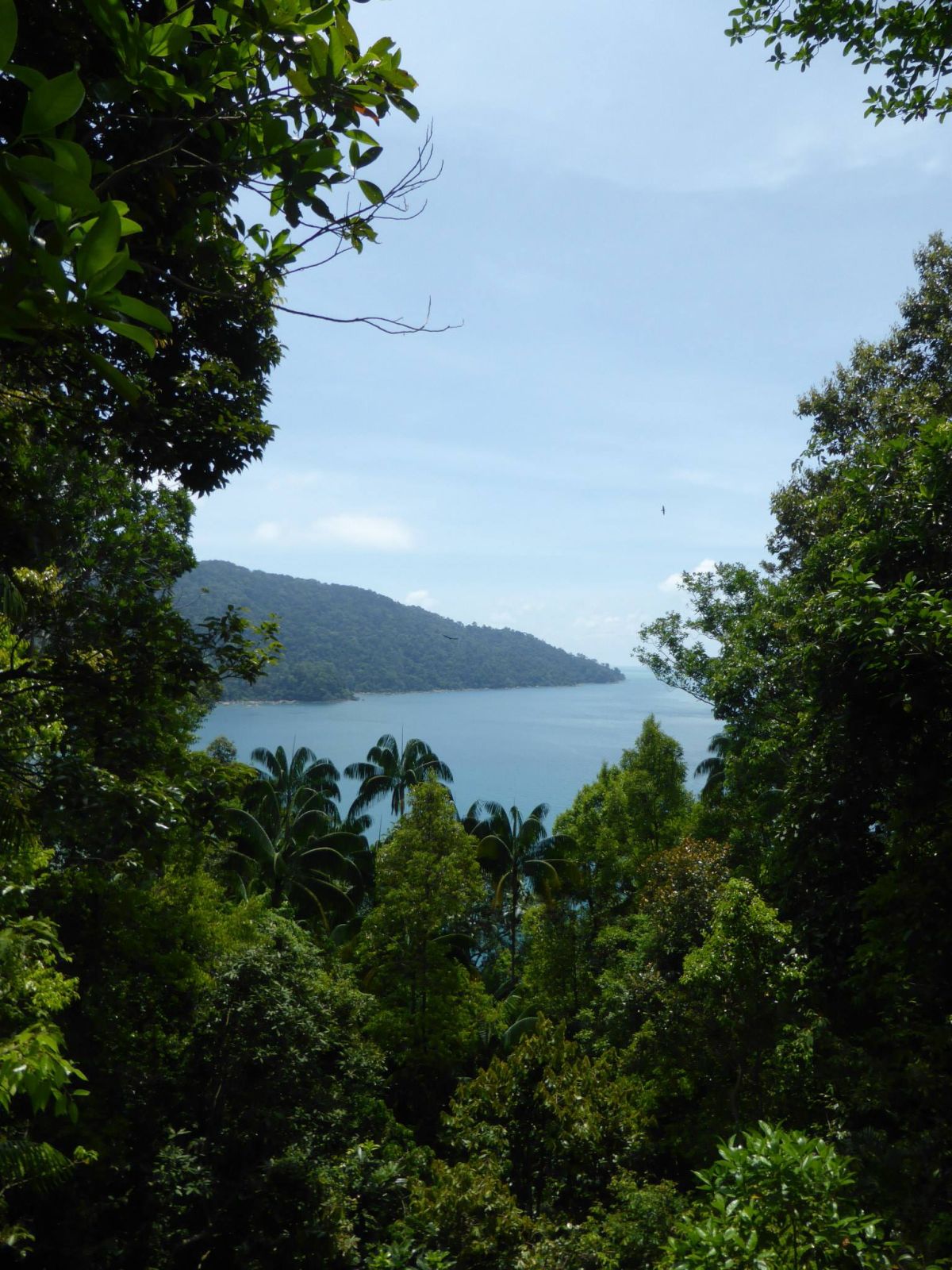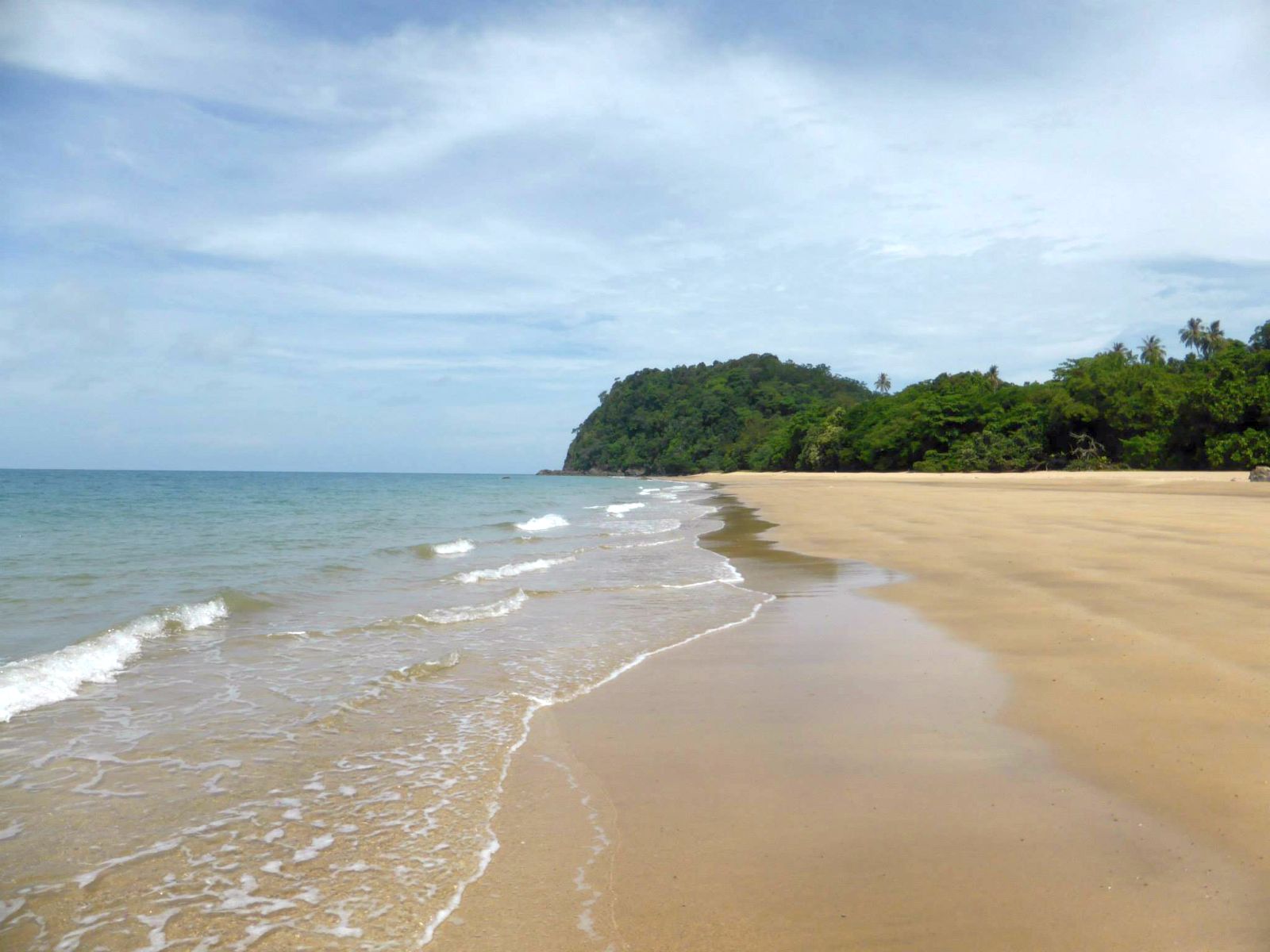Blurring The Lines In Telok Melano

Akhim angles his flat double-engine skiff into the aquamarine traffic of waves pushing down out of the South China Sea. He gestures at Gabriela toward the distant slope of green peninsula ahead where black threads of smoke drill into the sky. “My village,” he says proudly, “Kampong Serabang, and more further is Mohammed’s village.”
Behind us the sleepy fishing town of Sematan is already a speck. After four hours waiting on the sun-baked quay and some gentle but persuasive haggling, we’ve managed to arrange an impromptu homestay with Mohammed at Telok Melano, the westernmost village on Malaysia’s side of Borneo and only reachable by a 40-minute boat ride. In the back seat, both Malay chiefs flash us brown, puckered smiles. The ambient temperature is a crucible of 95 degrees, even with the salt-stained air whipping past us.
By the time Akhim drops us off and we wade ashore, there are plenty of eyes on both pale-skinned foreigners. On the way to his home Mohammed shows off the newest addition to his community, a three story school where we can already hear the chatter and laughter of children. Dirt paths wend between stilted houses where young girls and wiry, naked-chested men stare out with a mixture of lethargic suspicion and shy, eager smiles. Chickens scatter at our presence or linger in the branches of stunted trees, safely out of the reach of gaunt dogs that play at our heels.
“We have about 250 people, maybe 55 houses, and we take water from the sea and make it clean. Also, solar power,” Mohammed explains when we reach his house, a modest Western-style double room attached to a more traditional stilted shack. In the kitchen his round, jovial wife prepares us watered-down lemonade. “She doesn’t speak English,” he laughs. Gabriela frowns at the joke.
The 50-year-old chief dons an immaculate Manchester United jersey and seems forgetful as he repeats facts and anecdotes. He’s uncomfortable with silences, and takes pride in reminding us that his children all went to excellent universities, two of them now working as English teachers in the country’s capital, Kuala Lumpur.
His tone is gravelly, half-way between pride that they’ve been able to raise from the subsistence life of plying the ocean for fish or harvesting black and white pepper from the local plantations and regret that they live so far away. The communal bonds here are what hold life together.
“It is always like this,” he says one morning, treating us to delicacies like steamed sea-snails, spicy laksa and stingray paté. Two other passing villagers stroll into the kitchen and join us, laughing and joking in vowel-rich Malay and passing around a clove cigarette. “Whoever wants to come, everyone is welcome, the door is always open. Big family.”

Afterwards Gabriela and I wander down the dusty path, sidled by smoldering clumps of garbage and coconut husks. We only met a few days ago in Bako National Park, a few hours north of Sarawak’s capital of Kuching, but the Tasmanian local is decisive, sharply curious and intelligent, and uniformly laid-back, three qualities that have made her an ideal traveling companion. I begin to doubt whether I would have gathered the motivation to make it this far without her.
A month ago she was in Japan, tackling the famous 88 Temple Pilgrimage, a route I’ve been looking forward to myself. Up ahead she pulls on a traditional cotton bonnet like the type Japanese women wear in rice fields and covers her shoulders with a blue shawl, ever-conscious of the sense of propriety that reigns in the predominantly Muslim country. She revels in the flamboyant color schemes of the houses: pastel yellows and greens, robin’s egg blue and hot pink. A young naked child waves at us despite her mother’s attempt to give her a bath.
Very few in Melano speak English, and we are regarded with the same passive kindness and neglect one might give a stray dog. Resources are meager, but ample enough for their means. Everything follows a slower pace. Time is an irreducible abstraction in the humidity. Because of the village’s proximity to the Indonesian border, many of the residents actually herald from Kalimantan or further south, but the similarity in language and culture is so slight as to be non-existent.
Because of Melano’s remoteness, the border crossing — a short 20-minute walk away — is highly informal and subscribes to the same laissez-faire sensibility. Goods can be bought for a fraction of the price in Indonesia, and when we return that evening Mohammed is helping boys unload surplus wooden furniture purchased overland. “Good price!” he says, emphasizing a business acumen worthy of a chief.

The third day Gabriela wants to visit Penang Park which follows the coastline north and is both the smallest, newest and northernmost of the national parks in Sarawak at only about 9 square miles (unlike Kalimantan, whose parks are fewer, but range from 3,400 to 5,300 square miles). The trail is used primarily by rangers and dips through low-lying mangrove, humid jungles and burbling creeks. We veer off near one of the junctions to a wide mile stretch of white sand. Blue-green water laps at the beach in somnolent intervals. These beaches are famous as sea turtle breeding grounds and under the shade of trees further up the shore we find deep craters gouged out by the patient effort of scaled flippers.
At the top of a steep lookout we have lunch and Gabriela remarks on the seemingly innocuous patriarchy that seems to preside over daily life back in the village. When he talks, Mohammed tends to address me in favor of Gabriela, and his wife is very much the domestic icon, waiting hand and foot on him and his guests. “Did you notice how she doesn’t even sit with us for meals? She sits on the floor to one side, and then she and her mother eat after us,” the Australian notes.
Gabriela’s poignant observation forces an unvoiced but stringent social hierarchy to the surface. The division between men and women is palpable, not just in terms of daily habits — women do not operate the flared-tail boats that bring in tilapia and other abundant catches, just as men do not participate in the affairs of the house such as cooking — but also in their interactions.
Boys cluster together on their dirt bikes. In the shadow of palm trees women weave baskets and giggle amongst themselves. Groups are defined by sex, and there seems to be little mingling between them in public.
Only children and young couples seem to have broken the trend, and even then, the insulated confines of the village seem to evoke a conformation. Nevertheless, Melano is not exempt from the effects of globalization and the encroachment of Western influences. Five hours every night, solar power hums into television sets playing badly dubbed James Bond movies, a weak Wi-Fi router offers limited access to the Internet and Mohammed’s son, visiting from Kuching, fiddles deliriously on his new iPhone.
It speaks to another kind of division in the unique Malay/Indonesian society, a paradoxical hope for the future, with the maintenance of traditional ways of life running tangent to a younger generation seeking out education and employment in bigger urban centers like Kuala Lumpur. Even with the new primary school, most children attend the bigger high schools in Sematan or Kuching. “If they can learn English, it means they have a better chance,” Mohammed says, but seems unconcerned. “This is home,” he shrugs, as if it simplifies for him and for us a latent contact and inter-connectivity to place and the people who inhabit it.
On the fourth day we bid goodbye to both him and his wife, taking his hand in both of ours and lightly tapping our foreheads to it, then quickly touching our heart in a traditional salutation. Akhim has returned and revs the engines. On the open seat in front of us two girls and their mother hide their faces from the sun under a veil, the youngest with furious dark eyes, inquisitive, and a smile more honest than I could ever manage. Gabriela takes their picture with a Polaroid and offers it to them.
A curious gesture, I wonder, and somehow seditious. Somehow wrong, in what it is attempting to assume — or impose. A first-worlder’s snap moral judgement, even if I agree with it. As if years from now the same girl might look back and remember the kindness of a stranger or the warning implicit in the offer of a photo. This is who you were. Something that blurs the lines between the expectations she will learn to live up to, and what Gabriela and I see — knowing we have no right to — as the brighter possibilities she might have strived for.
Behind us Akhim takes a call on his smartphone, shouting over the motors’ roar, and I smile. Might still strive for, I correct, and stare into the wind.

 Jordan Mounteer is based out of Nelson, British Columbia, and splits his time between writing and traveling. His most recent adventures took him to sacred lakes in the Peruvian Cordillera, dark back alleys in Ho Chi Minh, and pilgrim trails in Japan. He is currently finishing a published manuscript and preparing to hike the Pacific Crest Trail in the United States.
Jordan Mounteer is based out of Nelson, British Columbia, and splits his time between writing and traveling. His most recent adventures took him to sacred lakes in the Peruvian Cordillera, dark back alleys in Ho Chi Minh, and pilgrim trails in Japan. He is currently finishing a published manuscript and preparing to hike the Pacific Crest Trail in the United States.
